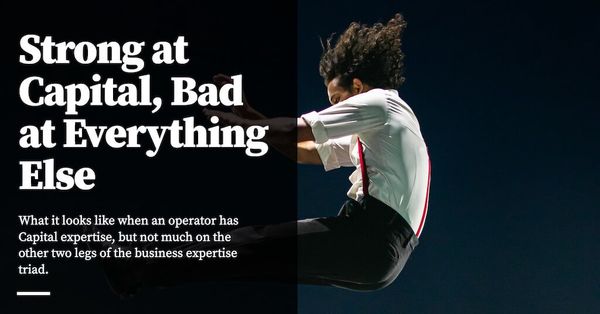Two examples of operators who were strong on the capital side of the business expertise triad, but weak in just about everything else.
This is Part 9 in a series on the expertise of capital in business. You may read the previous part here.
At this point in the Capital Expertise series, we’ve covered a large number of topics:
- We’ve examined the shape of the skill of Capital, which includes: a) skill at raising capital, b) skill at allocating capital, and c) skill at using capital as an enabler on the Operations and the Market sides of business.
- We’ve covered several cases of raising capital.
- We introduced two new concepts: the capital cycle — which we discussed from an operator’s perspective — and then the concept of capital allocation.
- We covered the bombshell idea at the heart of this series: that is, capital allocation is a path to a billion dollar outcome without luck.
- We then examined several examples of capital allocation — most notably last instalment’s Andy Beal, a largely unknown allocator who happens to be the richest, most successful banker in America.
In this instalment, we’re going to take a detour from positive examples of Capital Expertise to examine two negative examples instead. I’m purposefully limiting the number of negative examples here because it’s actually exceedingly common to talk about the failings of capital in mainstream media — there are, in fact, more stories of financial failures than there are knowledgeable stories of successful capital execution.
The reason, of course, is simple: it is easy to talk about financial failure. A journalist — any journalist, really — may just point to the still-steaming blast crater of a financial blowup. But it takes expertise to see examples of successful capital execution. One of the reasons I’ve spent this much time writing the Capital Expertise series is to make it easier to see such examples of capital expertise in action, so that you may hunt down concept instantiations of your own.
This week, we’re doing something simpler. In the past, I’ve alluded to business operators who are good at Operations and good at competing in their Market, but not so good at the skill of Capital. I’ve said, for instance, that it takes a bit of time for an average operator to realise that expertise in Capital is a thing, and that you can be outmanoeuvred by those who are good at it.
However, the opposite example also exists, and I would be remiss if we do not cover this.
In an Oaktree Capital Management podcast on the 2nd of November, 2023, Oaktree head of performing credit Armen Panossian had the following to say, in the context of a higher interest rate environment (all emphasis mine):
When you own a business, there are two ways to grow its enterprise value. There are taking on debt to invest in the company and building a manufacturing plant or doing some R&D for new products. That again, requires access to capital markets. The second way is just having a really good execution. Irrespective of how you’re capitalised, if you’re just really good in a particular sector and you have a secret sauce or a playbook to really expand enterprise value, that will show even if you have no debt.
Now, the leverage buyout industry has participants that do both. I think what we will find as the next year or two unfold is which of those private equity firms have the subject matter expertise to have grown enterprise value even on an unlevered basis? And then which of those private equity firms really needed access to cheap and consistently cheap capital to realise their equity returns. To quote Warren Buffett, which when the tide goes out is when you find out who’s been swimming without a bathing suit on. I think we will find that in spades in the next year or two, especially on the equity side and on the highly levered equity side.
To translate this to layman prose: the way private equity (PE) firms typically work is that they buy a company by putting the debt on the books of said acquired company, and then race against time to improve the business before spitting it back out again. How they improve the business is ... well, this is not so clear: they may do so by doing corporate surgery (as with Dell), or by installing better management, or by acquiring other businesses and lumping their operations together. The idea is that the debt they’ve put on the company’s books will eventually be paid down with the superior cash flows generated by their improvement activities; at the end of a handful of years (no more than 10, because PE firms run closed-end funds with similar time limits as VC firms), the PE owners sell the company or take it public and pocket the value gained.
Of course, this is all good in theory. What happens in practice runs the gamut from unqualified success to unparalleled shitshow.
What Panossian is saying is that the PE firms with actual operational expertise — that is, skill at the Operations and Market side of the business expertise triad — are the ones that are going to thrive in our current higher-interest-rate environment. The PE firms who are run by low-skilled financiers — who do mostly capital shenanigans — will likely be caught by the oncoming wave of expensive debt.
Here are two cases to illustrate what that looks like.
Originally published , last updated .
This article is part of the Capital topic cluster, which belongs to the Business Expertise Triad. Read more from this topic here→





